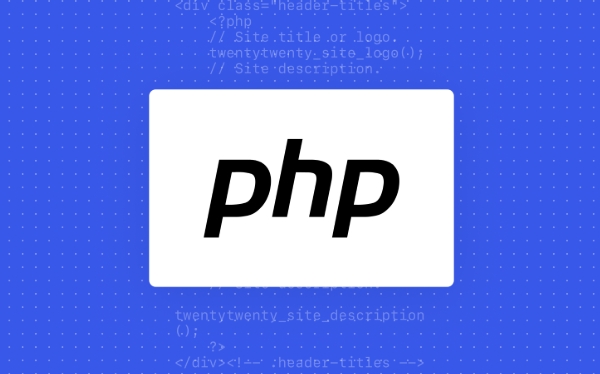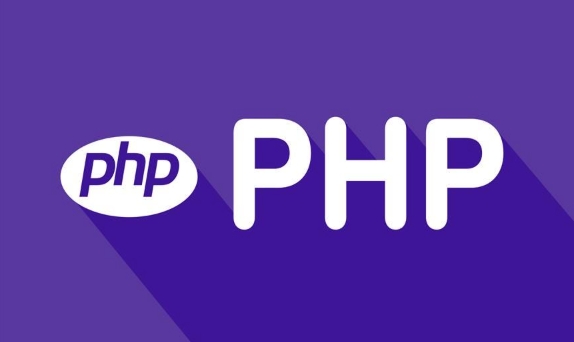Choosing the Right PHP Comment Style for Your Team
Jul 16, 2025 am 03:31 AMIn team collaboration development, choosing the right PHP annotation style can improve code readability, maintenance efficiency and communication costs. 1. Use single-line comments (// or #) to suit short descriptions, which are used to explain the meaning of variables or temporary notes. It is recommended to use local explanations and quick debugging inside functions. 2. Multi-line comments (//) are suitable for blocking large pieces of code or writing detailed logical descriptions. They can be used to close code blocks or comment deprecated functions during debugging, but be careful not to use them in nest. 3. Document comments (/*/) are standard for team collaboration, and support IDE prompts and automatic document generation, which are suitable for key information descriptions such as function usage and parameter types. In addition, the team should unify the annotation style and keep it updated to avoid mixing formats or ignoring modified synchronization. Annotations should be concentrated in key positions such as complex logic, algorithms and interface calls.

In team collaboration development, PHP annotation style may seem like a trivial matter, but choosing the right one can improve code readability, maintenance efficiency, and even reduce communication costs. The key is unity and clarity.

1. Use a single line comment (// or #) for a short description
// or # is the most direct choice when you just need to quickly explain what a line of code does. These two styles will not make the comments appear too heavy, and it is also convenient to add and delete quickly.
for example:

// Calculate the total price and apply the discount $total = $price * (1 - $discount);
This comment is suitable for writing above or to the right of the code to explain the meaning of variables, logical branches, or temporary notes. Pay attention to keeping concise and avoid long-term discussions.
suggestion:

- Local explanation used inside a function
- Comment out a line of code during quick debugging
- Avoid mixing multiple styles in the same code
2. Multi-line comments (/ /) Suitable for blocking large pieces of code or complicated instructions
/* */ is more suitable when you need to write a longer explanation, or want to temporarily disable multiple lines of code. It can wrap any content without destroying the original structure.
For example:
/*
This function is used to process user input.
Includes cleaning data, verification formats and storage to the database.
*/
function processUserInput($input) {
// ...
}Although not as standard as document annotation, it is more flexible in some scenarios. However, it should be noted that nested usage can lead to syntax errors, so be especially careful.
Applicable scenarios:
- Write detailed logical description
- Temporarily close a large piece of code during debugging
- Comment out deprecated but temporarily preserved functions
3. Document comments (/* /) is the standard for teamwork
If your project needs to generate API documents, or if you want the IDE to automatically prompt the function usage and parameter types, then be sure to use document comments (DocBlock).
The standard format is as follows:
/**
* User registration function, verify the mailbox format and save it to the database*
* @param string $email User email* @param string $password User password* @return bool Whether the registration is successful*/
function registerUser($email, $password) {
// ...
}This style not only helps automate the generation of documents (such as through phpDocumentor), but also improves code readability, especially in large projects or multi-person collaboration.
Benefits include:
- Improve code maintainability
- Support IDE smart prompts
- Convenient to generate developer documents
Small details: Don't ignore comment consistency and updates
No matter how good the annotation style is, it will be useless if no one maintains it. For example, some people use // , some people use # , and some people like to write /* */ , which looks messy. It is recommended that the team set a specification and write it into the code submission check.
In addition, comments should also be updated in a timely manner. For example, if you change the function function but do not change the corresponding annotation, the person who reads the code will be misled. This is worse than noting.
Finally, I would like to remind you: the more comments, the better, but you should write them clearly in key places. For example, complex conditional judgments, algorithm logic, third-party interface calls, etc., these are the areas worth noting.
Basically all this is not complicated but easy to ignore.
The above is the detailed content of Choosing the Right PHP Comment Style for Your Team. For more information, please follow other related articles on the PHP Chinese website!

Hot AI Tools

Undress AI Tool
Undress images for free

Undresser.AI Undress
AI-powered app for creating realistic nude photos

AI Clothes Remover
Online AI tool for removing clothes from photos.

Clothoff.io
AI clothes remover

Video Face Swap
Swap faces in any video effortlessly with our completely free AI face swap tool!

Hot Article

Hot Tools

Notepad++7.3.1
Easy-to-use and free code editor

SublimeText3 Chinese version
Chinese version, very easy to use

Zend Studio 13.0.1
Powerful PHP integrated development environment

Dreamweaver CS6
Visual web development tools

SublimeText3 Mac version
God-level code editing software (SublimeText3)

Hot Topics
 Why We Comment: A PHP Guide
Jul 15, 2025 am 02:48 AM
Why We Comment: A PHP Guide
Jul 15, 2025 am 02:48 AM
PHPhasthreecommentstyles://,#forsingle-lineand/.../formulti-line.Usecommentstoexplainwhycodeexists,notwhatitdoes.MarkTODO/FIXMEitemsanddisablecodetemporarilyduringdebugging.Avoidover-commentingsimplelogic.Writeconcise,grammaticallycorrectcommentsandu
 How to Install PHP on Windows
Jul 15, 2025 am 02:46 AM
How to Install PHP on Windows
Jul 15, 2025 am 02:46 AM
The key steps to install PHP on Windows include: 1. Download the appropriate PHP version and decompress it. It is recommended to use ThreadSafe version with Apache or NonThreadSafe version with Nginx; 2. Configure the php.ini file and rename php.ini-development or php.ini-production to php.ini; 3. Add the PHP path to the system environment variable Path for command line use; 4. Test whether PHP is installed successfully, execute php-v through the command line and run the built-in server to test the parsing capabilities; 5. If you use Apache, you need to configure P in httpd.conf
 PHP Syntax: The Basics
Jul 15, 2025 am 02:46 AM
PHP Syntax: The Basics
Jul 15, 2025 am 02:46 AM
The basic syntax of PHP includes four key points: 1. The PHP tag must be ended, and the use of complete tags is recommended; 2. Echo and print are commonly used for output content, among which echo supports multiple parameters and is more efficient; 3. The annotation methods include //, # and //, to improve code readability; 4. Each statement must end with a semicolon, and spaces and line breaks do not affect execution but affect readability. Mastering these basic rules can help write clear and stable PHP code.
 PHP 8 Installation Guide
Jul 16, 2025 am 03:41 AM
PHP 8 Installation Guide
Jul 16, 2025 am 03:41 AM
The steps to install PHP8 on Ubuntu are: 1. Update the software package list; 2. Install PHP8 and basic components; 3. Check the version to confirm that the installation is successful; 4. Install additional modules as needed. Windows users can download and decompress the ZIP package, then modify the configuration file, enable extensions, and add the path to environment variables. macOS users recommend using Homebrew to install, and perform steps such as adding tap, installing PHP8, setting the default version and verifying the version. Although the installation methods are different under different systems, the process is clear, so you can choose the right method according to the purpose.
 What is PHP and What is it Used For?
Jul 16, 2025 am 03:45 AM
What is PHP and What is it Used For?
Jul 16, 2025 am 03:45 AM
PHPisaserver-sidescriptinglanguageusedforwebdevelopment,especiallyfordynamicwebsitesandCMSplatformslikeWordPress.Itrunsontheserver,processesdata,interactswithdatabases,andsendsHTMLtobrowsers.Commonusesincludeuserauthentication,e-commerceplatforms,for
 python if else example
Jul 15, 2025 am 02:55 AM
python if else example
Jul 15, 2025 am 02:55 AM
The key to writing Python's ifelse statements is to understand the logical structure and details. 1. The infrastructure is to execute a piece of code if conditions are established, otherwise the else part is executed, else is optional; 2. Multi-condition judgment is implemented with elif, and it is executed sequentially and stopped once it is met; 3. Nested if is used for further subdivision judgment, it is recommended not to exceed two layers; 4. A ternary expression can be used to replace simple ifelse in a simple scenario. Only by paying attention to indentation, conditional order and logical integrity can we write clear and stable judgment codes.
 Your First PHP Script: A Practical Introduction
Jul 16, 2025 am 03:42 AM
Your First PHP Script: A Practical Introduction
Jul 16, 2025 am 03:42 AM
How to start writing your first PHP script? First, set up the local development environment, install XAMPP/MAMP/LAMP, and use a text editor to understand the server's running principle. Secondly, create a file called hello.php, enter the basic code and run the test. Third, learn to use PHP and HTML to achieve dynamic content output. Finally, pay attention to common errors such as missing semicolons, citation issues, and file extension errors, and enable error reports for debugging.
 How Do You Handle File Operations (Reading/Writing) in PHP?
Jul 16, 2025 am 03:48 AM
How Do You Handle File Operations (Reading/Writing) in PHP?
Jul 16, 2025 am 03:48 AM
TohandlefileoperationsinPHP,useappropriatefunctionsandmodes.1.Toreadafile,usefile_get_contents()forsmallfilesorfgets()inaloopforline-by-lineprocessing.2.Towritetoafile,usefile_put_contents()forsimplewritesorappendingwiththeFILE_APPENDflag,orfwrite()w






